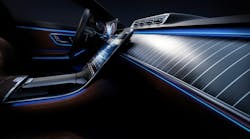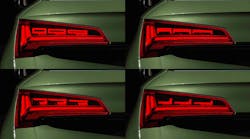The new device, which builds on established photodynamic therapy treatment (PDT) methods, not only reduces pain but has the potential to be used by patients in their own homes.
The device is the brainchild of St Andrews' physicist Professor Ifor Samuel, and dermatology consultant Professor James Ferguson, head of the photobiology unit at Ninewells Hospital Dundee. The OLED light source is a spin-off of Samuel's work on advanced displays.
PDT is a two-step process involving the application of a photosensitive drug followed by controlled exposure to a selective light source which activates the drug and destroys the diseased cells.
Samuel told LEDs Magazine that most drugs for PDT use red illumination. "Our LED emits in the range 590-630 nm," he said. "The device is a light-emitting circle of 2 cm diameter, which is large enough to treat a majority of lesions. The light output is a few milliwatts per square cm."
However, current PDT involves large, cumbersome and intense light sources, and the patient must sit or lie still under them for several hours during treatment in a hospital cubicle.
The OLED-based "light bandage" is a portable lightweight light source powered by a pocket-sized battery, which allows patients to go about their daily business while under treatment.
According to Samuel, for a typical patient the light is on for 3 hours - and the low intensity is less painful and expected to be more effective than other light sources.
Ferguson expects that the new device will have a major impact on the treatment of skin cancers. "The light-emitting patch is a low-cost, portable and convenient method of treatment," he said. "Our initial pilot trials have already shown its effectiveness and we find patients requesting this treatment over conventional methods."
In addition to the treatment of skin cancers, the researchers believe that the technology could also be used in the cosmetic industry, for anti-aging treatments or for conditions such as acne.
The patented technology was developed with support from Scottish Enterprise Proof of Concept funding and has been licensed to Lumicure Ltd, a spin-out company from the University of St Andrews and NHS Tayside, which is currently in discussions with venture capitalists to raise equity funds to commercialize the product.








